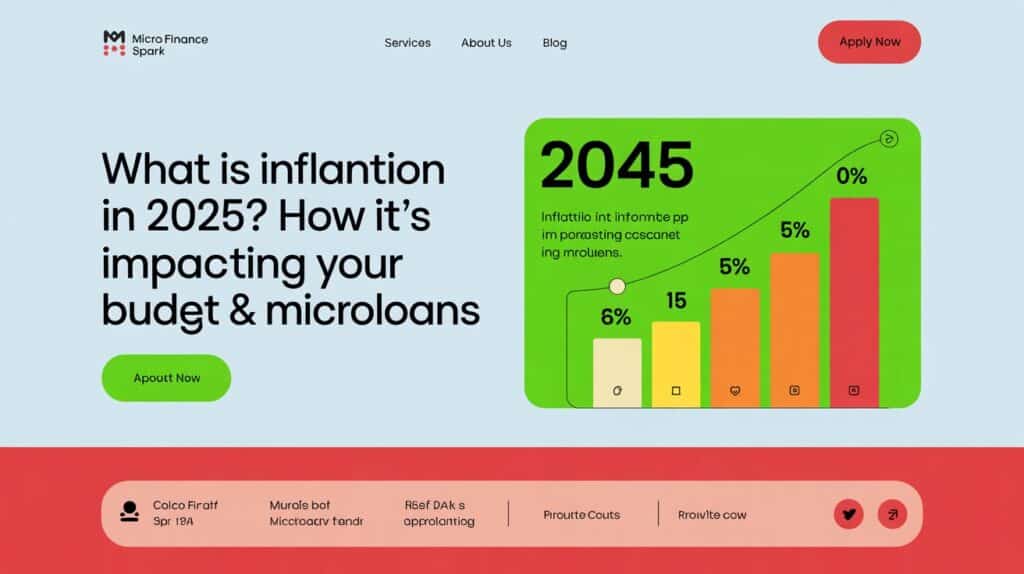The costs, as small or great as they are, increase every day, and at that point, your wallet starts to feel their impact. In 2025, the effect of inflation won’t just be a catchword anymore – it will have structured budgets, crushed purchasing power and changed the microloan market.
The following are some of the essentials about what is inflation and how it affects your financial life as of now:
Introduction to Inflation

Inflation is the gradual increase in prices that withers away the purchasing power of your money. It means that if you can buy something for $100 last year, it now costs around $110 or more.
From the Islamic perspective, any system that brings about economic injustice and weakens the poor is against the principle of balance (Al-Mizan), derived from Surah Ar-Rahman (55:7-9) in the Qur’an.
Must read about: Is a Stock Market Crash Coming? 2025 Signals & How to Protect Small Investments
What Is Inflation?
Inflation occurs generally in rising prices of goods and services because of costlier production or excess money supply. Normally, it reduces the real value of money, thereby making daily expenditure burdensome for the average person.
The Prophet Muhammad (ﷺ) said, “Do not cause harm or return harm” (Hadith – Ibn Majah), which scholars link to unjust economic practices-principally unchecked inflation.
Understanding Inflation
To truly understand inflation, you need to look at both its causes and consequences — from food prices to rent, everything shifts. It doesn’t always happen overnight; it builds slowly and quietly affects the poor first.
According to the Islamic scholars, hoarding, interest (usury), and unethical pricing have also been said to violate the Shariah. Hoarding, interest, and unethical pricing have also been said to undermine the stability of markets.
What Causes Inflation?
Price inflation can have many causes, but eventually, they all boil down to two- excess demand or sky-high production costs. Printing excess money, natural catastrophes or supply chain disruption, or all of them at once can contribute to this.
Islam, with an eye on fair trade, transparent transactions, prohibits monopolization and gharar or uncertainty that artificially inflates prices-as indicated in Surah Al-Baqarah (2:275) and from the prohibition of riba.
Is Inflation Good or Bad?
Whether inflation is good or bad depends on how much it’s rising and how it’s managed. Moderate inflation can say that the economy is growing; above that, it can eat away at savings—the cost of debt increases, and there is burden for the poor.
Nothing in Islamic finance is allowed which can hurt the economy, exploit or imbalance it—this is in accordance to the philosophy of the Prophet ﷺ: “Wealth should not circulate only among the rich” (Surah Al-Hashr, 59:7).
What Are the Effects of Inflation?
Inflation bites virtually all areas in an economy from grocery bills to housing, from transport to even microloans, and it eventually punishes the already low-income families through diminishing real wages making it harder again for them to afford basic consumption needs.
According to the Shariah, any system that disadvantageously creates existing disparities between the rich and poor or one that abandons zulm (oppression) goes clearly opposed to the very principles of justice and equality that constitute the basic foundations of Islam.
It is said that inflation tends to affect everything: grocery bills, housing, transport, microloans, and even issues like finance. Make low-income families suffer because of diminishing real wages, so it becomes much harder to afford basic needs.
According to the Shariah, any system that disadvantageously creates existing disparities between the rich and poor or one that abandons zulm (oppression) goes clearly opposed to the very principles of justice and equality that constitute the basic foundations of Islam.
Types of Inflation
Various forms of inflation exist, each with distinctive causes and ramifications on the economy. Some arise out of demand from consumers; others arise due to supply issues or simply the expectations of inflation.
Islam takes into account the interests of the economy and encourages the scholars to refrain from manipulative practices that cause inflation and violate the law of adl (justice) in transactions (Surah An-Nahl, 16:90).
Demand-Pull Effect
This occurs when the demand for goods and services is rising, which can’t be sufficiently accommodated by the economy’s supply. This ever-widening gap pushes prices, especially when people have more money to spend yet limited products to buy.
Ihtikar and artificial scarcity are both condemned by Islam: they exacerbate demand-pull inflation and were condemned by the Prophet ﷺ in sahih Muslim 1605).
Cost-Push Effect
Cost-push inflation manifests when the costs of production, such as raw materials or labor, increase, and producers pass on that increase to buyers. This type of inflation is observed in the course of chaotic supply chains or soaring energy prices.
In Islamic perspective, businesses should price their products fairly (tas’ir) and avoid charging buyers excessive prices, as in the case of the Prophet’s ﷺ rejection of price fixing as unjust (Sunan Abu Dawood 3451).
Built-In Inflation
Built-in inflation results from expectations of impending price rises. Hence, workers demand more wages from employers, ultimately leading to a resultant inflationary price condition.
This builds a cycle whereby prices are raised by businesses in response to demands of higher wages. This phenomenon is not merely concerned with economics; it is, rather, a psychological and policy issue.
Islamic economics emphasizes vigilance and accountability that will cut malign cycles and protect trust between an employer, worker, and society (Surah Al-Mutaffifin, 83:1-3).
The Formula for Measuring Inflation
Generally, inflation is measured with changes in prices over time using a formula:
Inflation Rate = [(Current Price – Previous Price) ÷ Previous Price] × 100.
This percentage represents how quickly the purchasing power of money is declining, a major indicator for any economy.
Islam gives a lot of weight to clarity and transparency.
Types of Price Indexes
Economists follow different indices to make an appraisal of inflation. Price indices assess the price changes on a range of goods. Consumption items such as wholesale or other production inputs are included.
In Islam, accountability is a basis of accurate market information as fraud or malfeasance goes against the interests of both the buyer and seller.
Consumer Price Index (CPI)
The Consumer Price Index is the measure of price changes of certain goods and services purchased by households for daily consumption, like food, clothing, rent, and transport. It indicates cost-of-living effects by measuring their costs in relation to budgetary limits for most persons.
The merit of transparency on the above data is that it interprets the Islamic demand for justice in the mu’amalat realms and helps eliminate exploitation particularly of poor people.
Wholesale Price Index (WPI)
The Wholesale Price Index (WPI) measures changes in prices of bulk goods sold between firms before the goods are consumed finally by the end-user. It acts as one of the leading indicators of upstream inflation, indicative of future increases in retail prices.
According to Islamic law, an awareness of price trends early is conducive to honest trading methods and prevents unforeseen markups in business transactions preserving equity in business dealings (Surah Al-A’raf, 7:85).
Producer Price Index (PPI)
The Producer Price Index (PPI) measures price changes that businesses receive for their goods at wholesale. It serves as a warning of inflation before the goods reach the consumer level-the price of goods before consumers get hold of them.
In Islam, this coincides with the concept of preventing darar in the market, which monitors pricing at every stage to guarantee fairness for both producer and consumer.
How is Inflation Measured?
Inflation is measured by recording the change over time in prices by indexes, CPI, WPI, and PPI. These groups track price change on the basis of carefully selected sets of data that manifest the real impact on the economy.
While Islam strictly forbids cheating in weights and scales, reporting the market rightly and honest financial dealings are ordered in the Qur’an (Surah Al-Mutaffifin, 83:1-3).
Compare the Price of the Shopping Basket from Year to Year
A retail price inflation formula compares the yearly price of a given “basket of goods.” These goods include necessities such as food, clothing, fuel, and rent—an indicator of how daily living costs are increasing.
Islam treasures awareness of finances and warns against deceiving consumers in support of such systems.
Different People Buy Different Things
On the contrary, a person like a taxi driver must have felt the much impact of fuel prices compared to his counterparts who work from home.
The very different types of expenses families have are only but a fraction of what a single man or an old woman would need to declare, having all contented with the same degree of inflation.
This is why Islam is concerned regarding the fact, and even justice which it encourages is an individualistic one where financial policies have to be made for various economic needs and not put it in hardship (mashaqqah) into the community.
Some Price Changes Are More Important Than Others
Not every price change affects people the same way — an increase in the price of bread affects them much more profoundly than an increase in the price of a luxury car. So that is why in deflating the prices, essentials weigh more than the essentials.
That’s why there is consideration about the core of human needs in economic polity and ethical trade under the principle of necessity (darurah) with which Islam distinguishes this.
Weight of Products in the HICP
All these products or services in the Harmonized Index of Consumer Prices (HICP) are given a weight on the basis of consumption towards a household budget. Items such as food rent and utilities will weigh more than entertainment items.
Thus, this is a mosaic supported by Islam in fair measurement – balancing out with what is important to the society and protecting the economically vulnerable, as seen in the teachings of maqasid al-shariah (objectives of Islamic law).
How Is the HICP Calculated?
The whole idea of scope and method of the HICP really contains the collection of prices of hundreds of goods and services in various regions and weights assigned to it in order to compute the average inflation in the society. This unification tends to be applied toward tracking consumer inflation across countries.
Rather this is what Islam recommends as far as matters of accounting truthfully and precisely in economic affairs are concerned, where no group is misrepresented and made unduly burdened by poor data.
Who Calculates the HICP?
The HICP is calculated by national statistics offices within each EU member country, coordinated by Eurostat, the European Union’s official statistics agency.
Such organizations would then go on to collect and approve this information every month for the purification of the data.
Islam promotes the concept of trustworthy authority (amana) in communal affairs such as pricing and wealth distribution-an obligation that should not be easily taken.
Comparable Across Countries
One of the remarkable features of the HICP is that it is comparable across countries because it uses a harmonized methodology to provide the fairest picture of inflation across the Eurozone. Such transparency will facilitate the work of policy makers for example cross-border decisions.
Indeed Islam advocates international fairness and economic justice in tune with the Qur’anic teachings on cooperation and mutual benefits,(Surah Al-Hujurat, 49:13).
How Inflation Impacts Prices
Rises- prices of all goods and services increase as time goes by; however, sometimes slowly and at other times suddenly. This kind of rise in prices would eventually reduce the actual worth of money meaning a lesser purchase with the same amounts.
Islam disallows economic practices, which causes problems to the people and increasing prices without proper moral justification may also come under zulm (oppression) and thus not permissible in Shariah (Surah Ash-Shura, 42:40).
How Does Inflation Affect Consumers and Companies Differently?
Consumers feel inflation firsthand, as goods like groceries, fuel, or rent become costlier. Most companies will pass on their increased costs down to consumers, but small-scale businesses may not be able to stand even for a pinch.
Islam encourages mutual consciousness and disallows exploitation, teaching that trade should be just, fair, and not causing any hardship to either producers or consumers (Al-Mutaffifin 83:1-3).
A Practical Example: How Is Inflation Affecting the US Healthcare Industry?
In the US healthcare industry, inflation has increased the price of medical supplies, wages, and insurance premiums which prevent millions from affording care. Costs of operation are going up for hospitals and clinics, while on the other hand, patients with financial constraints tend to put off treatments.
An Islamic perspective poses ethical questions since easy access to health services is a fundamental right, and if price itself becomes an obstacle against timely treatment then this goes against the prophetic saying: “there should be neither harming nor reciprocating harm” (Sunan Ibn Majah).
Why Was Inflation So High in 2024?
This spike will come about due to the various factors globally associated with the supply chain disruption, energy shortages, and an aggressive monetary policy that pushed excessive money into circulation.
There was post-pandemic demand, but production could not catch up, sending prices spiraling to unprecedented levels. Islamic economics speaks of moderation (wasatiyyah) and carefully warns against artificial booms or imbalances that ruin society (Surah Al-A’raf, 7:31).
How to Protect Your Finances During Inflation
To protect your money against inflation, invest in multiple assets and refrain from unnecessary expenses. Some assets such as gold and real estate can keep the value constant, preserving your purchasing power.
Islam teaches responsible stewardship of wealth as well as the avoidance of excessive risk, following the guidance of the Prophet ﷺ to make plans without greed or harm (Hadith, Tirmidhi).
Hedging Against Inflation
Hedging is the act of taking measures in order to guard against increasing prices and usually involves investing in assets that grow with or outgrow inflation. Such assets could be real estate, stocks, or commodities.
And Islamic finance goes well with ethical amounts, marks transparency and fairness, while avoiding speculation and interest when it comes to affairs, all in accordance with Shari’ah principles.
How Can Organizations Respond to High Inflation?
Organizations could improve operational efficiency, renegotiate contracts with their suppliers or pass on some costs to consumers in a sensible manner. They could also innovate ways to reduce input dependency on price volatile factors.
In Islam, business has to balance profit with social responsibility and avoiding exploitation and gaining public trust (Surah Al-Mutaffifin, 83:1-3).
How Can CEOs Help Protect Their Organizations Against Uncertainty During Periods of High Inflation?
CEOs can lead by creating flexible strategies, investing in market research, and fostering strong relationships with stakeholders. Preparing for volatility helps organizations adapt quickly without compromising ethics or employee welfare.
Islamic leadership values consultation (shura) and justice, ensuring decisions protect all parties involved — a model for resilient and fair governance.
How Inflation Can Be Controlled
Governments and central banks control inflation by adjusting interest rates, tightening money supply, and regulating spending. These tools help slow down price rises and stabilize the economy.
Islam encourages responsible governance and warns against policies that cause harm or injustice, emphasizing balance and fairness in economic management (Surah Al-Baqarah, 2:143).
Meaning of Inflation, Deflation, and Disinflation
Inflation means rising prices, deflation refers to falling prices, and disinflation is when inflation slows down but prices still rise. Each impacts the economy differently; inflation erodes purchasing power, deflation can stall growth, and disinflation signals easing price pressures.
Islamic economics values stability and moderation, encouraging systems that avoid extreme swings which harm society’s welfare.
What is Deflation?
Deflation occurs when the general price level drops, often due to weak demand or excess supply. While lower prices might sound good, deflation can lead to decreased business profits, job losses, and a shrinking economy.
Islam teaches to avoid harm and injustice in all economic conditions, promoting policies that support sustainable growth and protect the vulnerable (Hadith: “None of you should wish for death…” – Sahih Muslim).
Examples of Inflation
Throughout history, inflation has shown up in many forms, from mild to hyperinflation. For example, post-World War I Germany experienced extreme inflation, wiping out savings and disrupting daily life.
Islam teaches us to learn from history and avoid repeating mistakes that cause economic injustice and social hardship (Surah Al-Hashr, 59:18).
What Are Some Periods in History with High Inflation?
Periods like the 1970s oil crisis or Zimbabwe’s hyperinflation in the 2000s highlight how supply shocks and poor policies can drive prices sky-high. These events caused widespread poverty and uncertainty.
Islamic principles stress the need for stable governance and ethical economic policies to prevent such turmoil and protect the community’s welfare.
Euro Area Inflation
In recent decades, inflation in the Euro area has generally stayed moderate thanks to coordinated monetary policies by the European Central Bank. However, occasional spikes reflect global shocks like energy price hikes or pandemics.
Islam encourages international cooperation and justice in economic affairs, which aligns with the Eurozone’s efforts to maintain price stability for millions.
Advantages and Disadvantages of Inflation
Inflation isn’t all bad — it has both advantages and disadvantages depending on how fast it moves and how it’s managed. Understanding these helps individuals, businesses, and policymakers respond wisely.
Islam encourages moderation and balance, warning against extremes that cause harm or injustice in society.
Advantages
Moderate inflation can stimulate spending and investment, encouraging economic growth and job creation. It helps borrowers repay debts with “cheaper” money over time, which can ease financial pressures.
From an Islamic perspective, as long as the system promotes fairness and avoids exploitation, gradual inflation aligns with the idea of economic facilitation (rukhsah).
Disadvantages
On the flip side, high inflation reduces the value of savings, making it harder for people — especially the poor — to afford necessities. It creates uncertainty, disrupting business planning and causing market volatility.
Islam strictly forbids practices that cause harm or injustice, including economic imbalance that leads to poverty and hardship (Surah Al-Baqarah, 2:188).
Key Takeaways
Inflation affects prices, purchasing power, and economic decisions in many ways — sometimes good, sometimes challenging. Understanding its types, causes, and measurement tools helps you protect your finances wisely.
Islam encourages fairness, transparency, and balance in all economic matters to ensure the well-being of the whole community.
The Bottom Line
Inflation is a natural part of economic life but needs careful management to avoid harm. Whether you’re a consumer, business owner, or policymaker, staying informed and acting ethically is key.
By combining modern knowledge with timeless Islamic principles, we can build an economy that’s fair, stable, and just for everyone.
Conclusion
Understanding What Is Inflation in 2025? How It’s Impacting Your Budget & Microloans is crucial as rising prices reshape your daily expenses and borrowing costs. Inflation eats into your purchasing power, making essentials costlier and microloans more expensive to repay.
Staying informed helps you adjust your budget and protect your finances wisely. By blending practical strategies with ethical guidance, you can navigate these changes confidently.
Ultimately, knowing how inflation affects you empowers smarter decisions—ensuring your financial stability even in uncertain times.

Maria Jolly is an experienced blogger at Micro Finance Spark, passionate about simplifying finance for everyday readers. With a sharp eye on trends in crypto, markets, budgeting, and smart saving, Maria delivers insightful, easy-to-understand content to empower informed financial decisions.






